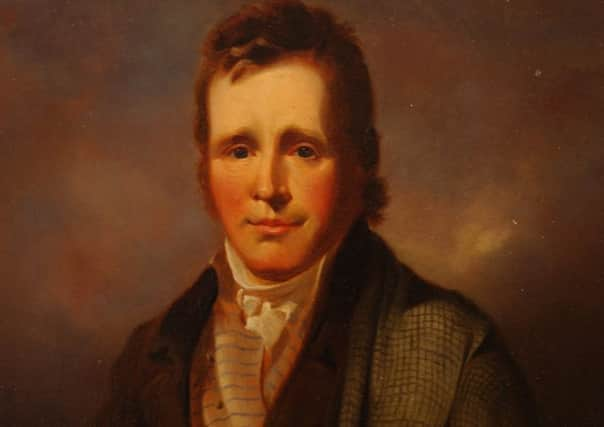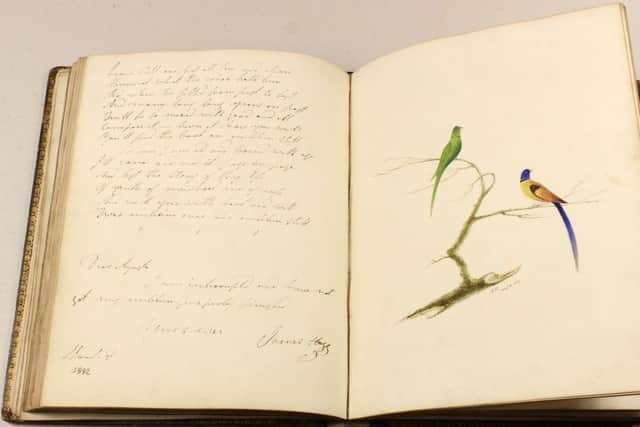Unknown poem by Scots writer found in journal of Queen Victoria wet nurse


The handwritten poem by the “Ettrick Shepherd” is a verse admiring the youthful beauty of the 15-year-old Augusta Gow, and was written in 1832, when Hogg was 62 years old.
The James Hogg Society now plans to include the poem, which is scrawled in Gow’s “commonplace book”, in a volume of previously unknown works by Hogg due to be published in the next couple of years.
Advertisement
Hide AdA commonplace book is a journal which served to collect thoughts, quotes, poetry and art work. They were particularly popular among young girls in the early 19th century.


Hogg is recorded in a letter to a friend as saying that he “despises such things”, but was “almost daily obliged to contribute to the whims of other people in these matters”.
In the somewhat risqué poem, Gow from Edinburgh is described as a “virgin” and her book “unstained and pure” as an “emblem of thy mind and thee”.
Hogg also pledges that when he is “old and bowed with age”, they will look at the book together and “list the story of thy life/ Of youth and maidhood and of wife.”
Academic Dr Holly Faith Nelson, secretary of the James Hogg Society, which is based at Stirling University, said the poem had been adapted and personalised and written in the book of another girl, Jane MacAlpin, a year later, but that the original version had never before been seen.


Nelson, who transcribed the poem from Hogg’s original writing, said: “This poem addressed to Augusta Gow in Augusta’s album/commonplace book and dated 2 March 1832 is an important find for those who work on the life and writings of James Hogg, the Ettrick Shepherd. It appears to have gone unnoticed until this point.”
Advertisement
Hide AdA newspaper report from The Scotsman in 1841 says that Gow – the daughter and granddaughter of renowned Scottish musicians Nathaniel and Niel Gow respectively – was, following her marriage to Frederick Alexander Packer and the birth of her own child – appointed as wet nurse to Victoria, the Princess Royal, the first daughter of Queen Victoria.
The queen is widely known to have found the idea of breastfeeding repellent, considering it the “ruin” of refined young ladies.
Advertisement
Hide AdTwenty years later, Gow moved to Australia, where she worked as a music teacher, specialising in “Scottish songs and the music peculiar to Scotland”, according to Australian media at the time.
Rare book seller Charles Nelson of Kernoozers, who unearthed the poem in the commonplace book, said: “It was quite a big thing for Miss Gow to have James Hogg write in her commonplace book – he was a bit of a rock star back then.”
To my dear Augusta Gow
Augusta could a thought so rare
Play round thy heart all guileless fair
Thy heart so light and debonair
That e’er this splendid book could be
Filled with love sonnets made to thee
With wit with humour or indeed
With aught that mortal man could read
O virgin dear, it may not be
This comely volume here I see
Is emblem of thy mind and thee.
Once it was all unstained and pure
From aught of [love] or aught of lure
From sordid print or [floweret] fine
Or music of the sounding line
Nay, though you have had it through and through
’Twas fairer than the virgin snow.
And who dared hint by word abjurer
That my Augusta is not purer
O shame how couldst thou so abuse it
As ope its breast and press to use it
Nay leave it as you may remember
Within a graceless poet’s chamber
O no Augusta virgin dear
The book must not be emblem here
Leave still one leaf all fair and clean
Memorial what the whole has been
And when tis filled from first to last
And many long long years are past
’Twill be so mixed with good and ill
Compass it—turn it how you will
You’ll find the book an emblem still.
When I am old and bowed with age
I’ll come and read it page by page
And list the story of thy life
Of youth and maidhood and of wife
And we’ll agree with heart and will
’Twas emblem once and emblem still.
Transcribed by Dr Holly Faith Nelson